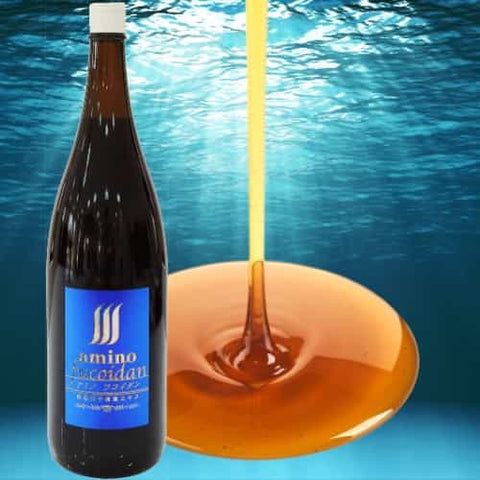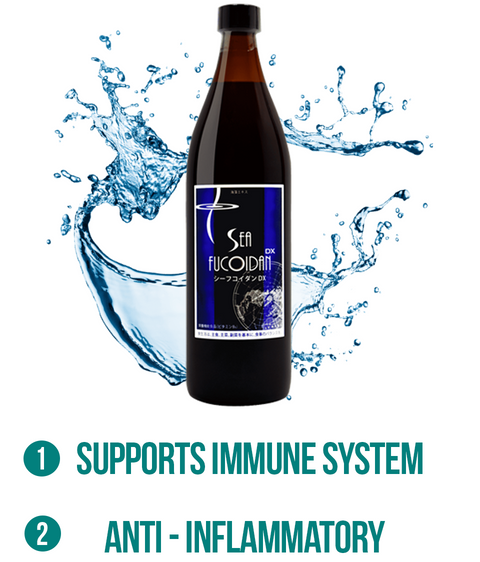Long & Best Seller Fucoidan
What is Fucoidan?
Fucoidan is a natural extract derived from brown seaweeds such as kelp, wakame, kombu, and especially Mozukuseaweed from Okinawa, Japan. It’s important to note that fucoidan is a seaweed extract, not a drug, meaning there are no strict limitations on daily intake. While it is advisable to start with recommended doses, users can adjust the amount according to their individual health needs as they become accustomed to it. Fucoidan has been widely studied for its potential to support immune health, reduce inflammation, and promote overall wellness, including cardiovascular support and anti-aging effects.
What is Fucoxanthin?
Fucoxanthin is a carotenoid pigment also found in brown seaweed, responsible for its brownish hue. Unlike fucoidan, fucoxanthin is valued for its role in fat metabolism, weight management, and antioxidant protection. Studies suggest that fucoxanthin may promote fat burning by activating a protein in fat cells called UCP1, which helps the body burn fat more effectively.
Differences Between Fucoidan and Fucoxanthin
Though both are derived from brown seaweed, they differ in structure and function:
- Fucoidan: A polysaccharide, recognized for its immune-boosting, anti-inflammatory, and cardiovascular benefits.
- Fucoxanthin: A carotenoid, primarily studied for its role in weight management and antioxidant effects.
Low Molecular Weight Fucoidan vs. High Molecular Weight Fucoidan
- Low Molecular Weight Fucoidan: This form is composed of smaller molecules, making it easier for the body to absorb. It is recommended for those seeking rapid health benefits, such as immune support and anti-inflammatory effects.
- High Molecular Weight Fucoidan: Larger molecules that are absorbed more gradually, offering prolonged health benefits, such as cardiovascular protection and long-term cellular support.
Daily Recommended Intake and Flexibility
For general wellness, we recommend starting with 30 ml to 60 ml per day, but there are no strict limitations on intake. If you are dealing with health concerns, a higher intake of 240 ml to 360 ml per day may be beneficial. Since fucoidan is not a drug but a natural seaweed extract, you are encouraged to adjust your intake based on how your body responds. Each bottle comes with a 30 ml measuring cap, and for best results, we suggest taking fucoidan on an empty stomach or before meals.
Purity and Safety: Removing Arsenic and Iodine
At our company, we take extra care in ensuring that our ultra-low molecular weight fucoidan is of the highest purity. During the extraction process, we specifically remove any harmful substances, such as arsenic and iodine, naturally found in seaweed. This ensures that our fucoidan is not only effective but also safe for long-term consumption.
How to Make Fucoidan Easier to Drink
Fucoidan has a distinctive seaweed flavor, which might not be to everyone’s liking. Here are some tips to make it more enjoyable:
- Chill it in the refrigerator before drinking, as cold fucoidan has a milder taste.
- Use a straw to minimize direct contact with your taste buds.
- For those who find the flavor too strong, we recommend trying our fucoidan capsules, available in low molecular weight form. Capsules allow you to avoid the taste entirely. Be sure to take the capsules with plenty of water for optimal absorption.
The Benefits of Fucoidan
- Immune System Support: Fucoidan boosts the activity of immune cells, enhancing the body’s natural defenses.
- Anti-inflammatory Effects: It reduces inflammation, making it beneficial for joint health and managing chronic conditions.
- Cardiovascular Health: Fucoidan helps lower cholesterol and improves circulation, supporting heart health.
- Anti-Cancer Potential: Studies suggest that fucoidan may promote apoptosis (programmed cell death) in cancer cells and inhibit tumor growth.
- Gut Health: Fucoidan supports a healthy gut microbiome, aiding digestion and overall wellness.
- Wound Healing & Anti-Aging: It promotes tissue regeneration and protects against oxidative stress, slowing the aging process.
Why Trust World Peace Inc. for Fucoidan?
At World Peace Inc., we have been specializing in fucoidan since 1998, making us one of the most experienced and trusted suppliers in the industry. We pride ourselves on offering authentic, high-quality fucoidan products that are backed by years of research and commitment to excellence. Our products are trusted by customers worldwide due to our attention to quality, purity, and safety.
In addition to providing reliable, authentic fucoidan, we are known for our fast and efficient shipping. Orders are typically processed and shipped the same day, ensuring that you receive your products quickly and efficiently. Our customer service team is always available to assist with any questions or concerns, offering prompt and professional support.
Conclusion
Fucoidan is a powerful, natural seaweed extract with numerous health benefits. While the recommended intake is 30 ml to 60 ml per day for general health maintenance, those with health concerns may take 240 ml to 360 ml per day. As it is not a drug, there are no strict limitations on daily intake, allowing you to adjust according to your needs. Additionally, our ultra-low molecular weight fucoidan is processed to remove harmful substances such as arsenic and iodine, ensuring safe consumption. Whether you choose the liquid form or capsules, fucoidan can play a vital role in supporting your overall health and well-being. Trust World Peace Inc., a leader in fucoidan since 1998, to provide you with the highest quality products and exceptional customer service.

30ml-60ml a day of Fucoidan for your health
Ultra-Small Molecular Weight Fucoidan - Why Our Fucoidan is the Best
World Peace Inc. has been selling Fucoidan since 1998 and is one of the most established retailers and wholesalers of Fucoidan in Japan. Our Fucoidan products are known for their superior quality for many reasons. Let us introduce the key factors that have made our company and products the top choice for long-time customers.
Reason 1: Ultra-Small Molecular Weight
The most unique and important reason customers choose our Fucoidan products is due to their ultra-small molecular weight. Mozuku Fucoidan, in its natural form, has a high molecular weight, making it difficult for the human body to digest and absorb. The molecular weight that the human body can typically absorb is around 3000. Even though Fucoidan is known to be beneficial, if the molecular weight is too high, it simply passes through the body without being absorbed.
Our products have been meticulously studied and developed, reducing the molecular weight of Fucoidan from its original over 200,000 to an ultra-low molecular weight of 500. This groundbreaking reduction (which is patented globally) is the key reason our Fucoidan has been a best seller since 1998.
Reason 2: Over 13% Sulfate Group Bond
The sulfate group bond is crucial when selecting Fucoidan. To maximize Fucoidan's health benefits, the sulfate group bond must remain over 13%. Typically, when reducing the molecular weight of Fucoidan, the sulfate bonds are broken. However, after years of research, we have succeeded in maintaining a sulfate group bond of over 13% in our ultra-small molecular weight Fucoidan products, ensuring maximum efficacy.
Reason 3: Rich Natural Ingredients
We believe that the quality of the ingredients is paramount, especially for those who consume Fucoidan daily. Our Fucoidan products are sourced from two pristine locations: the clean, unpolluted waters of the Kingdom of Tonga and the rich seas of Okinawa, Japan. Mozuku from both these regions is known for its high Fucoidan content. Hand-harvested by local divers, our ingredients are carefully selected to ensure safety, purity, and the highest quality for our customers.
Reason 4: Removal of Iodine and Arsenic
Some customers may be concerned about the presence of iodine or arsenic in seaweed-based products. Our ultra-small molecular weight Fucoidan undergoes a special process that removes these substances, making it safe for customers who need to avoid iodine or arsenic.
Reason 5: Made in the Southern Part of Japan
Fucoidan research advanced significantly in 1996, as it was discovered that the Japanese diet, rich in seaweed, contributed to the health and longevity of the elderly population. Fucoidan has a deep historical connection with Japan, and our products are proudly made in Fukuoka, in the southern part of the country. This region has long been associated with authentic seaweed products, and we ensure that our Fucoidan is always shipped fresh.
Reason 6: Reliable and Speedy Service
At World Peace Inc., we strive to provide the highest level of customer satisfaction. As both a retailer and wholesaler of Fucoidan products, we are proud of our fast shipping and prompt customer service. Most orders are shipped the same day they are received, and we always respond to customer inquiries as quickly as possible. If you have any questions, don’t hesitate to reach out to us.
Reason 7: A Trusted History
With over 25 years of experience in selling ultra-small molecular weight Fucoidan, we are one of the oldest Fucoidan retailers in Japan. We take great pride in our long-term customers, many of whom have enjoyed lasting health benefits from our products over the years.
Who we are
World Peace Inc. - Highest Quality Made in Japan Fucoidan
Authenticity You Can Trust
At World Peace Inc., we proudly offer genuine, authentic Fucoidan and Fucoxanthin products, all made in Japan. Being located near our manufacturing facility ensures that each product we ship is fresh and of the highest quality. In an online market filled with counterfeit products, we stand apart by rigorously verifying the authenticity of everything we sell, so you can trust that you’re receiving the real thing.
A Legacy of Reliability
Since 1998, World Peace Inc. has been a leader in fucoidan products. Although fucoidan was first discovered in 1913, it gained popularity in 1996, and we were among the first to introduce Ultra-Low Molecular Weight Fucoidan to the market in 1998. With over two decades of experience, we are deeply committed to delivering only the best products to our customers around the world.
Fast and Efficient Shipping
We understand the importance of timely service. That’s why at World Peace Inc., we ship most orders on the same daythey are received. However, during holidays and public holidays in Japan, there may be slight delays. Rest assured, we are committed to getting your products to you as quickly as possible. Additionally, our customer service team is always on standby, ready to respond to any inquiries promptly.
abundant natural nutrients
Abundant natural nutrients made in Japane products
About Our Japanese Fucoidan
Mozuku Fucoidan: A Premium Type of Fucoidan
Mozuku Fucoidan, extracted from the brown seaweed Cladosiphon okamuranus—commonly referred to as Mozuku—is found in the pristine waters surrounding Okinawa, Japan. This type of Fucoidan is renowned for its high concentrationand unique chemical composition, making it a highly purified form of fucoidan. The extraction process uses a proprietary method that ensures the removal of impurities while preserving the seaweed's natural components, resulting in a product with superior quality and efficacy.
Key Health Benefits of Mozuku Fucoidan
Mozuku Fucoidan has been extensively studied for its wide range of potential health benefits, including:
- Anti-inflammatory Properties: Studies suggest that Mozuku Fucoidan can reduce inflammation, which may help alleviate symptoms of chronic inflammatory conditions.
- Immune-boosting Effects: Mozuku Fucoidan supports the immune system by enhancing the activity of immune cells, helping the body to fend off infections and diseases.
- Anti-cancer Potential: Research has shown that fucoidan may promote the destruction of cancer cells and inhibit tumor growth.
- Cardiovascular Health: By improving blood circulation and reducing cholesterol levels, Mozuku Fucoidan can contribute to overall heart health.
- Wound Healing: Fucoidan's regenerative properties have been linked to improved wound healing and tissue repair.
- Anti-aging Effects: Thanks to its antioxidant properties, Mozuku Fucoidan can help slow the aging process by protecting cells from oxidative damage.
Why Japanese Mozuku Fucoidan Stands Out
Several factors contribute to the popularity and effectiveness of Japanese Mozuku Fucoidan:
- High Purity and Concentration: Japanese Mozuku Fucoidan is celebrated for its high concentration of fucoidan and its unique chemical structure. The extraction process ensures a high-purity product that retains the beneficial compounds of the seaweed.
- Wide Range of Potential Health Benefits: The health benefits of Mozuku Fucoidan have been widely studied, including its anti-inflammatory, immune-boosting, anti-cancer, cardiovascular, wound-healing, and anti-aging effects.
- Positive Impact on the Gut Microbiome: Fucoidan has been found to positively influence the gut microbiome, promoting better digestion and overall health.
- High Palatability: Japanese Fucoidan, particularly Mozuku Fucoidan, is known for its mild flavor, making it easy to consume as a supplement, whether in drink or powder form.
- Cultural and Traditional Significance: Japan has a long history of using seaweed for both culinary and medicinal purposes. This tradition has helped establish Japanese fucoidan, especially Mozuku Fucoidan, as a trusted and culturally significant product.
- Japan’s Reputation for High-Quality Products: Japan is internationally recognized for producing high-quality goods, including supplements. This reputation adds to the popularity of Japanese fucoidan, as consumers trust that they are receiving a premium product.
What is Ultra Small Molecular Weight
Ultra Small Molecular Weight
Molecular weight is a way of measuring the mass of a molecule. It is usually measured in units of daltons (Da) or ato,mic mass units (amu). To calculate the molecular weight of a molecule, you add up the atomic weights of all the atoms in the molecule.
For example, the molecular weight of water (H2O) is 18.015 Da. This is because the molecular weight is the sum of the atomic weight of two hydrogen atoms (1.008 Da each) and one oxygen atom (16.00 Da).
In simpler terms, molecular weight is a way to measure how big a molecule is. It can be used to compare the size of different molecules or to see if two molecules are similar in size. It is also used in different fields of science, like chemistry and biochemistry, to understand the properties of a substance such as its density, solubility, and viscosity.
Low molecular weight refers to molecules that have a relatively small mass compared to other molecules of the same type.
The benefits of low molecular weight molecules can vary depending on the specific substance and application. Some examples of benefits of low molecular weight molecules include: Enhanced bioavailability: Low molecular weight molecules are usually smaller and therefore able to pass through cell membranes more easily, which can increase their bioavailability (the amount of a substance that enters the body and is available to have an active effect). Improved solubility: Low molecular weight molecules are often more soluble in water and other solvents, which can make them easier to use and handle in industrial and laboratory settings. Reduced toxicity: Low molecular weight molecules may have a reduced potential for toxicity compared to higher molecular weight molecules of the same substance because they are less likely to bind to and damage vital cellular components. Low molecular weight fucoidan has been studied as an anti-inflammatory and anti-cancer agent, and also as a potential treatment for viral infections.

Ultra Low Molecular Weight Fucoidan
25 years have passed since the first bottle of Sea Fucoidan was created. Over time, we have perfected the extraction process, improving product quality and increasing purity, resulting in the highest quality Fucoidan available today.
Following years of joint research conducted with specialist health institutions, we introduced Sea Fucoidan DX in 2015 as a superior Fucoidan supplement compared to our traditional Fucoidan.
To this day we continue to invest in research to improve our products, which is why our supplements are loved by thousands of health conscious customers around the world.
HOW CAN FUCOIDAN IMPROVE YOUR HEALTH?





